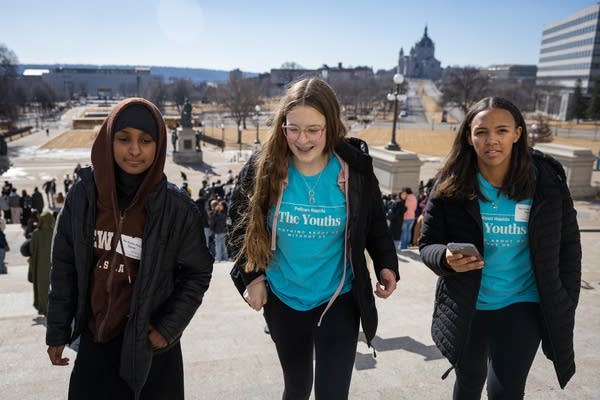In Pelican Rapids, teens learn the skill of civil discourse

Go Deeper.
Create an account or log in to save stories.
Like this?
Thanks for liking this story! We have added it to a list of your favorite stories.
On an afternoon in February, Ikraan Mohamed, 16, was sitting on the floor of the Minnesota Senate Office building, practicing a pitch for state lawmakers to fund community youth centers.
“I care about this because it’s not fun driving around and using gas when all you want to do is hang out with your friends,” Mohamed read from her script. “A solution for this is to give our small towns more attention and give support and help fund the youth center we are building.”

Mohamed is a sophomore at Pelican Rapids High School. For the last few years, she’s been working with other teens in her town to open a place where they can gather. Most of the time, middle and high schoolers are just hanging out in parking lots because there’s nowhere else for them to spend time together.
“People that don’t do sports just don’t have an after school space in our community,” she said.
Turn Up Your Support
MPR News helps you turn down the noise and build shared understanding. Turn up your support for this public resource and keep trusted journalism accessible to all.
Mohamed and her fellow students are also participating in a new program called Beyond Civics. It’s teaching them how to identify issues in their community that they care about and then do something about them.
The Pelican Rapids group is one of four cohorts participating in the program’s pilot this spring. Groups meet weekly for several months and learn an array of skills from identifying gaps in their community services to understanding how to listen empathetically and find common ground.

Libby Stegger is executive director of Civic Bridgers, the nonprofit that came up with the idea for Beyond Civics.
Stegger said that in a deeply divided country, giving young people tools to be involved in politics and their communities is important.
“Young people in particular have this incredible power that they sometimes don’t even realize they have. It’s the power of hope, the power of optimism, the power of their fresh perspectives and ideas,” she said.
But Stegger said that when young people look at the current political climate, they don’t feel empowered to do much at all. The Beyond Civics program is trying to break that cycle.
“This is a program where young people build their own community action projects. So they come to us … on an issue that they care about,” she said. “We help them break it down, so that it feels achievable, so that they know the next steps to make civic engagement possible, and to do it in ways that bring people together.”

That’s the case with the Pelican Rapids youth center that teens there are advocating for.
Staci Allmaras has been helping the students make their case for the project.
“We’re really good at putting, you know, parks in for little kids, and I'm glad that we do all these things,” she said. “But there is just this age between 11 and 20 that often gets missed. And there's a need for communities to step-up and come alongside their young people."
Allmaras said that this group of students in Pelican Rapids is remarkably diverse. Many identify as Somali American or Latino, which reflects the town’s growing diversity, too. Allmaras said the Beyond Civics program bridges some of those generational and demographic divides by teaching the kids to find common ground.
One way they’re doing that is working with local officials and some of the older residents in town to figure out what to do with an old church in the town.

It’s been donated for the kids to use for their gathering space, but they also want to make it hospitable to older residents, too.
After eating some pizza and practicing their speeches a little longer, the group makes their funding ask to one of their state legislators.
“If we had a youth center, we could go and create a safe environment for everybody who doesn't have one, and they can create relationships,” said Pelican Rapids high schooler Sadia Rufai.
The group later found out that the Legislature won’t be able to fund renovations this year. But there’s still good news. Another state grant has come through that will get the work started.



